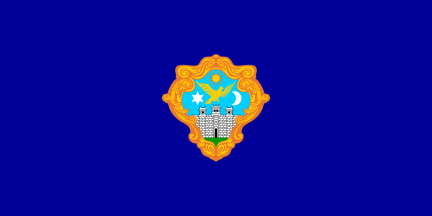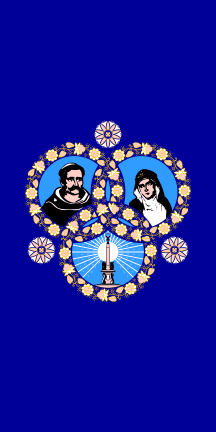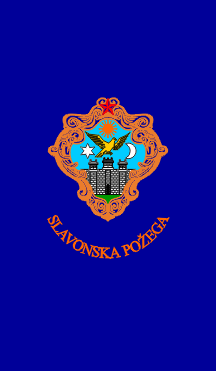 (1:2)
(1:2)by Zeljko Heimer, 25 June 2000

Last modified: 2003-10-10 by dov gutterman
Keywords: pozega | croatia | pozesko-slavonska | saint teresa |
Links: FOTW homepage |
search |
disclaimer and copyright |
write us |
mirrors
 (1:2)
(1:2)
by Zeljko Heimer, 25 June 2000
See also:
Other sites:
Poz<ega - A city of some 30 000 inhabitants in the middle
of Slavonia region. It is situated in the valley called by
ancient Romans Vallis Aurea encirceled by low mountains and one
of the most fertile parts of Croatia. In medieval Croatia Pozega
was already important trade center and seat of the county in 13th
century. (No flags are reported from that period, though). The
Turks enter Pozega in 1536 and remain there until 1691. During
that time Pozega is the capital of sandjak covering most of
Slavonia. After the Tuirkish period, Pozega is again seat of the
county, remaining so until 1923, when the county structure is
abandoned, and was not reintroduced until 1993, when it became
capital of Poz<es<ko-slavonska county.
The coat of arms of the city of Pozega is in use at least since
1702, and is officially granted on 1 September 1765 by empress
Maria Theresia, when Pozega acquired the status of the "free
and royal city". It consists of a blue shield in baroque
ornamented border, with three towered city walls and above those
a golden eagle with spread wings, silver crescent and star, and a
golden radiating sun. The same coat of arms (heraldically, with
slight modernization of artistic redention) was readopted on 9
September 1993, when the flag was adopted, too, blue with the
coat of arms in the middle. Ratio 1:2.
Source: Pozega - turisticki vodic, Turisticka zajednica
Grad Pozega, 1996. "Ime, grb, zastava i Dan grada", pp.
38-42.
Zeljko Heimer, 22 June 2000
See at <www.pozega.hr>,
AN image of the magistrate of Pozega, hoisting the flags of
Croatia, the County and the City (properly ordered!).
Zeljko Heimer, 3 November 2000
pz-pz.gif)
by Zeljko Heimer, 25 June 2000

Ceremonial flag - obverse
by Zeljko Heimer, 22 June 2000

Ceremonial flag - reverse
by Zeljko Heimer, 22 June 2000

Ceremonial flag - reverse - detail
by Zeljko Heimer, 26 June 2000
There exsists also a ceremonial flag, that is vertical, and
with golden fringe. On the reverse, three are richly ornamented
roundels containing images of fra Luka Ibrisimovic, the leader of
uprising against the Turks in 1688 and liberator of the city,
Saint Teresa of Avila (sv. Terezija Avilska), patron of the city,
and the column of the Holly Trinity, erected in the city center
in 1749, in memory of 798 citizens died in the plague of 1739.
(when city had only two tousend inhabitants). It seems that the
ceremonial flag is not unique, but there exists several of them,
some being hoisted in front of the main buidings of the city.
Source: Pozega - turisticki vodic, Turisticka zajednica
Grad Pozega, 1996. "Ime, grb, zastava i Dan grada", pp.
38-42.
Zeljko Heimer, 22 June 2000

Flag obverse
by Zeljko Heimer, 28 September 2003

Flag reverse
by Zeljko Heimer, 28 September 2003
pzpz7.gif)
Coat of Arms
by Zeljko Heimer, 28 September 2003
The city of Požega was named Slavonska Požega since
1929 until 1991 so to differenciate from the Požega city in
central Serbia between Užice and Cacak.
In 1974 the local assembly decided to celebrate the 750
anniversary of the first mention of the city name in 1227 that
would be held in 1977. It was decided that a new flag should be
made for the occasion. The flag was produced in a specialized
workshop of the Order of the Sisters of Mercy in Zagreb. It was
designed by Frano Paro, academic painter and grapical worker, and
it was based waguely reminiscent to the Požega voluntary
fire-fighting society from 1875 (this one is blue swallow tailed
guidon with coat of arms painted in the middle and patron on the
revers with floral golden ornaments embroideried on it and is
also preserved in the Požega City Museum).
The blue silk flag is fringed with gold. On the obverse is the
coat of arms of the city, with the red five-pointed star
incorporated in the ornament and the name of the city below. The
reverse is ornament of the corn and vine elements with the years
of the anniversary encirceled with rays formed by the flowers
representing symbolically surrounding villages. The inscriptions
names the Požega Valley in Latin and Croatian: Vallis Aurea
- Požeška kotlina.
Since the end of the celebrations in 1977 the flag is preserved
in the Požega museum.
This flag was certainly in turn the model for the current city
flag adopted in 1993.
I would like to point out how cunningly is the red star
incorporated in the design, as it was here from ever!
Zeljko Heimer, 28 September 2003